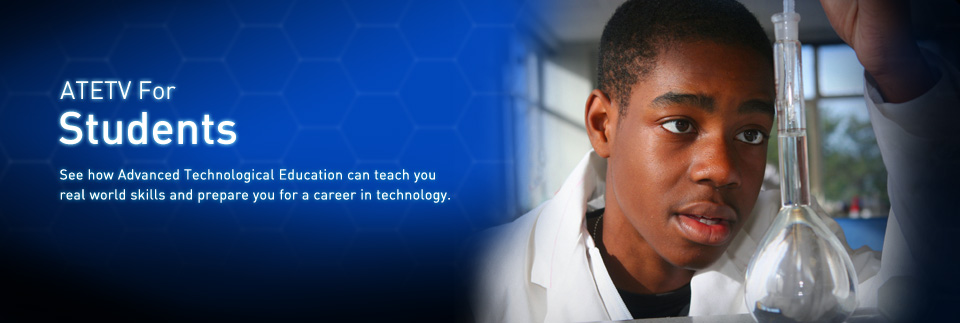
Whether you’re fresh out of school and new to the job market, considering switching careers, or even just wondering what types of technical job opportunities exist today, you should take a look at ATE programs at community colleges around the country. Each week, ATETV features interviews with ATE students and educators, providing first-hand accounts of their experiences. In addition, many of the episodes also feature interviews with employers who describe their success in hiring ATE grads.
A Focus on Cutting-Edge Careers
Wind energy and fuel cell technology. Video simulation and game development. Biotechnology, environmental technologies, lasers and photonics – even national security. These are just a few of the exciting training programs available through ATE.
Paul Marquis was moving from job to job before he decided to enroll in the Wind Energy program at Laramie County Community College. “I’m learning lasting skills,” says Paul. “There’s a reason our country is looking for new sources of energy and this is a good one.” The emerging field, which harnesses power from the wind to create electricity, is a prime example of the types of industry on which ATE programs are focused – innovative and forward-thinking technologies that address the pressing needs of our country today. Whether it’s the creation of sustainable power sources, adaptation to environmentally efficient farming and agriculture or rapid manufacturing and biotechnology, the ATE programs are at the forefront of tomorrow’s industries.
“These are the jobs that are experiencing the greatest growth rate in the country today,” says Elaine Craft, director of the South Carolina ATE Resource Center and an ATETV advisor. “These are the jobs that have been defined as those that will keep our country competitive.”
And not only are these good-paying careers, they’re also challenging – and exciting.
“Many of the students coming into our programs are interested in a career change,” says Laramie’s Michael Schmidt. “These folks are looking at [wind energy] as something that is important for our society and our environment. When my students come to class, people aren’t sleeping. They are very focused on their learning and are excited to be here.” Watch ATETV’s interviews with students in a variety of technological programs and you’ll come away with same sense of enthusiasm!
Real-World Instruction
An emphasis on hands-on training makes these two-year community college programs a great option for students who are eager to jump in with both feet. In addition to classroom courses, a majority of the curriculum that you will encounter in ATE programs provides students with real-world instruction using state-of-the-art technologies.
And perhaps most important to many students, ATE program instructors are highly experienced, bringing real-world knowledge to the classroom and providing students with a nuanced picture of technology industries, and the insights that will help them better prepare for careers in their fields.
ATETV provides a close-up look at some of these hands-on training programs, like the Fuel Cell Technology program at Stark State College. Part of the college’s mechanical engineering program, the two-year fuel cell curriculum incorporates mathematics, chemistry and physics, as well as specialized fuel cell studies.
But, according to student Dena Mayhorn, “The beauty of this two-year course is the hands-on learning component. You’re in the labs, you are putting all the parts together, you’re seeing how it works. It doesn’t make a whole lot of sense just from the book. You really need to get your hands on it and see it working.”
Flexibility and Support
ATETV also examines the curricular offerings provided through ATE Centers, which provide plenty of support and guidance, working closely with students to help guarantee their success.
“That is the nice thing about the community college atmosphere,” notes Andrew Maynard of Springfield Technical Community College. “If you have been out of school for awhile or if you had trouble with math, for example, in high school, we have remedial classes to bring you up to the college level so that you don’t fail.” Advance testing and placement helps guarantee that students are where they need to be, setting them on the path to success, even in subjects as difficult as high level mathematics.
And, if after a two-year community college program, you decide you’d like to go on to pursue a bachelor’s degree, an ATE associate’s degree can help pave the way – and maybe even help pay the way. According to Gordon Snyder, executive director and principal investigator at the National Information and Communications Technology Center at Springfield Technical Community College and an ATETV advisor, many employers will help pay for the remaining two years of a bachelor’s degree.
“[You] can come out with a two year degree from a community college. [You] can get a nice job. [You] can get paid well. And [you] have an opportunity for continuing education that the company will pick up. The potential is almost unlimited if a student wants to go that track.”

